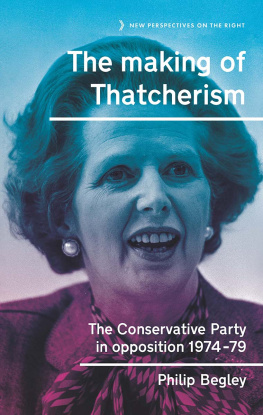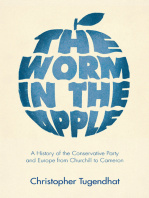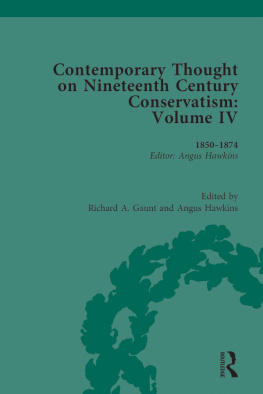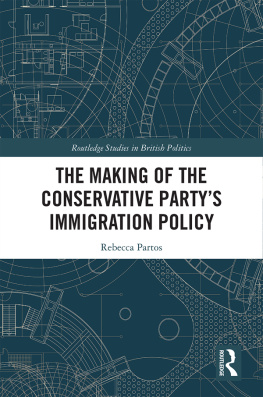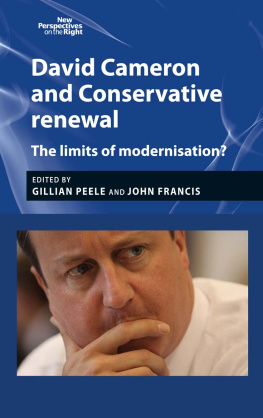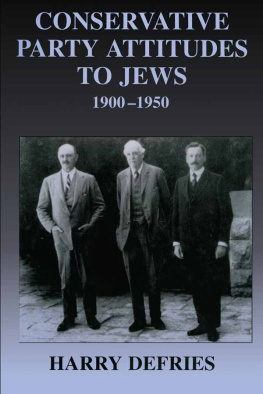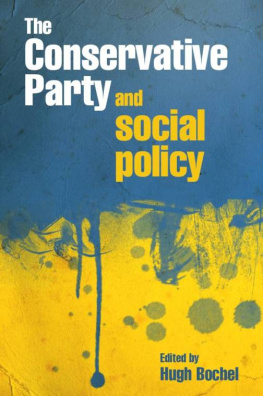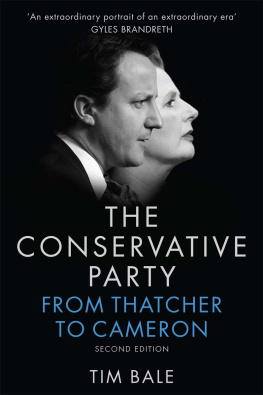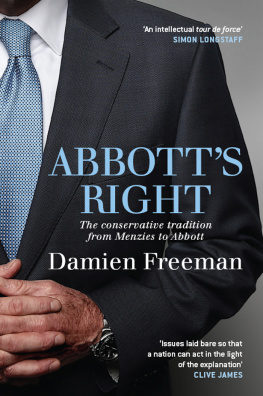The making of Thatcherism
Series editor
Richard Hayton
The study of conservative politics, broadly defined, is of enduring scholarly interest and importance, and is also of great significance beyond the academy. In spite of this, for a variety of reasons the study of conservatism and conservative politics was traditionally regarded as something of a poor relation in comparison to the intellectual interest in the Left. In the British context this changed with the emergence of Thatcherism, which prompted a greater critical focus on the Conservative Party and its ideology, and a revitalisation of Conservative historiography. New Perspectives on the Right aims to build on this legacy by establishing a series identity for work in this field. It will publish the best and most innovative titles drawn from the fields of sociology, history, cultural studies and political science and hopes to stimulate debate and interest across disciplinary boundaries. New Perspectives is not limited in its historical coverage or geographical scope, but is united by its concern to critically interrogate and better understand the history, development, intellectual basis and impact of the Right. Nor is the series restricted by its methodological approach: it will encourage original research from a plurality of perspectives. Consequently, the series will act as a voice and forum for work by scholars engaging with the politics of the right in new and imaginative ways.
Reconstructing conservatism? The Conservative Party in opposition, 19972010
Richard Hayton
Conservative orators: From Baldwin to Cameron
Edited by Richard Hayton and Andrew S. Crines
The right and the recession
Edward Ashbee
The territorial Conservative Party: Devolution and party change in Scotland and Wales
Alan Convery
David Cameron and Conservative renewal: The limits of modernisation?
Edited by Gillian Peele and John Francis
Rethinking right-wing women: Gender and the Conservative Party, 1880s to the present
Edited by Clarisse Berthezne and Julie Gottlieb
English nationalism, Brexit and the Anglosphere: Wider still and wider
Ben Wellings
Cameronism: The politics of modernisation and manipulation
Timothy Heppell
The making of Thatcherism
The Conservative Party in opposition, 197479
Philip Begley
Manchester University Press
Copyright Philip Begley 2020
The right of Philip Begley to be identified as the author of this work has been asserted by him in accordance with the Copyright, Designs and Patents Act 1988.
Published by Manchester University Press
Altrincham Street, Manchester M1 7JA
www.manchesteruniversitypress.co.uk
British Library Cataloguing-in-Publication Data
A catalogue record for this book is available from the British Library
ISBN 978 1 5261 3130 0 hardback
First published 2020
The publisher has no responsibility for the persistence or accuracy of URLs for any external or third-party internet websites referred to in this book, and does not guarantee that any content on such websites is, or will remain, accurate or appropriate.
COVER IMAGE: Margaret Thatcher speaks at a press conference on 19 September 1983.
Rob Bogaerts / CC0 1.0 Universal Public Domain
Typeset in Arno Pro by
Servis Filmsetting Ltd, Stockport, Cheshire
Contents
This book has been a long time in the making. This means that I have received advice and support from many different people. Thank you to my colleagues over the years at the University of Lincoln and the University of Liverpool, especially expert supervisors Krista Cowman and Ian Packer, and Catherine Bochel and Sally Sheard, who kindly allowed me time to work on a book. Thank you to the many archivists and librarians I have encountered, especially the ever helpful Andrew Riley at the Churchill Archive Centre. Thank you to everyone at Manchester University Press and series editor Richard Hayton. Thank you to my friends, especially Matthew Francis who has been a consistent source of intellectual support. Most of all, thank you to Stephanie and Henry and my family.
This book considers the development of Conservative Party policy between 1974 and 1979. This period has often been seen as one of significant change in Britain, with Conservative policy one part of much wider and more dramatic changes. However, if 197479 is examined in detail then much of this change appears more modest and more complex than has often been appreciated. This book will explain why policy developed in the ways that it did, what the implications might be for wider conceptions of British politics and examine the 1970s through the prism of Conservative policy. There were a range of factors pulling the Conservatives in different directions during this period. At times policy moved forward because of these forces but at others its development was slowed. In order to understand this period and the changes in Conservative policy fully, we need to take a rounded view and have an appreciation of the intellectual, economic and social contexts of the time. However, the central contention of this book is that the short-term political context was most important and helps to explain why Conservative policy did not change as much as might initially be expected.
The first step in recognising this is to understand how the period has been viewed to date, beginning with the Conservative general election victory in May 1979, which brought an end to five years in opposition and could be seen as a turning point in British politics. In simple terms, the result was significant. Margaret Thatcher became Britains first woman Prime Minister, having returned her party to government with the largest swing in support towards any party since 1945. Politically, Thatcher and the Conservatives were at the heart of these changes. Did 1979 confirm the end of one political settlement and open the way for its replacement? Did a kind of collective experience during the 1970s, shaped by political, social and economic developments, help to make 1979 a turning point?
It is clear that something of real interest did happen at that general election. Whether or not they realised it, the electorate returned a Conservative government with its own set of ideas and its own particular range of policies, and it would have a period of secure majority government in which to implement them. Much of the rhetoric around the election, and indeed much of the rhetoric that had permeated the years leading up to it, gave the impression that on some level the Conservatives wanted to reverse the course of recent history. The possibility of serious change was at least on the agenda. Tellingly, both Thatcher and the Labour Prime Minister James Callaghan, though they raised the prospect for different reasons, appeared to agree that the Tories wanted to break with the mix of policies that had been ascendant since at least the mid-1960s. But of what did this desire for change actually consist? Had the policies of the Conservative Party really broken through and become popular? Or did the public generally hold only a vague impression that the Conservatives offered something different from that which they had experienced under Labour?

